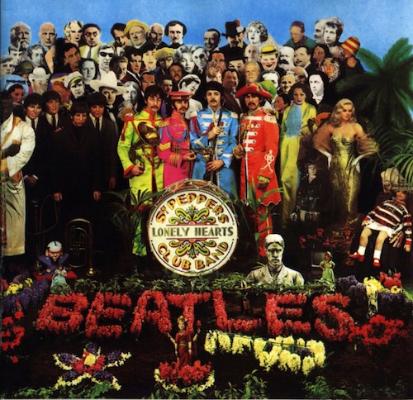1. The BeatlesSgt. Pepper’s Lonely Hearts Club Band

It all started with The Beatles. All the Beatles albums really, Sgt. Pepper’s was only their top jewel (we found out about Chuck Berry, Elvis Presley and the whole ’50s rock & roll era only later, and it was not that directly important for us). We were still in the ’60s, some of us were five, six, seven years old, and the quality of life in socialist Yugoslavia was decent and getting even better. Being the leading non-aligned country in the world, we were trading with the East, West, South and North (Yugoslavia in the ’60s had opened its borders also to the West). Many people from the country went to work in Germany, Austria, Switzerland and they returned with western goods, big cars, fancy clothes, magazines, records. Even the Yugoslavian self-managing socialist system gave some decent economic results and working families were rapidly introducing modern household machines and equipment, made in Yugoslavia: fridges, washing machines, B&W TV sets, telephones, gramophones, etc. Politics was fairly liberal for a communist country and the official state art direction was modernism, with a bit of a touch of socialist realism, but not too much. We started to get specialised magazines in shops, comic books, socialist soft porn adult magazines, magazines dedicated strictly to pop music and culture, with full-colour print only on the front pages. We could even buy a special Beatles fan club monthly newspaper. We could watch foreign TV series and music shows on TV and that’s how life started for us, before we even went to primary school. The Beatles were the symbols of all this growing excitement. They were everywhere and everybody loved them. Even our parents loved them. Their songs were constantly on the radio and TV and their albums were licensed by state record labels in the country, such as Jugoton, and sold in official record shops, which we soon got, even in small cities like Trbovlje. All the kids wanted to be John, Paul, George or Ringo, walking around in shorts but with longer and longer hairstyles. Soon there was also a whole bunch of uniformed electric bands all over Yugoslavia who looked like the Beatles, but dressed in different uniforms and called themselves Red Boys, Blue Boys, Blue Stars, Electrons, Hurricanes, Birds, Chameleons, Red Chorales, Pharaohs, Dynamites, Young Lions, Silhouettes, etc. Music festivals started everywhere, not quite like those in the West, but nevertheless they were music festivals.
In 1988, Laibach released its own version of the Let It Be album. In 1990, Heather Mills, who fell in love with a close friend of ours, also born in Trbovlje, drove with him to our town, listening to Laibach’s Let It Be cassette in the car, before she ever heard the Beatles’ original. Later she married Paul McCartney. We were told that apparently McCartney once played the album on one of his shows, entertaining the audience while they entered the venue, but we could never find out if this was really true. In 2005, McCartney and Heather visited Slovenia incognito. They slept in Tito’s ex-villa at Bled and visited the capital city of Ljubljana – nobody recognised him on the streets, except a beggar, who shouted after him: "The Beatles, The Beatles!"


